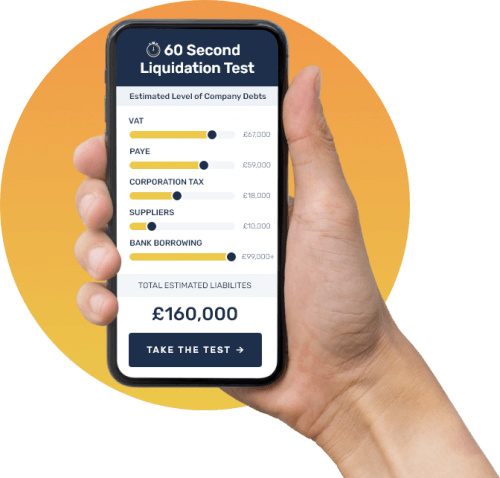Understanding HMRC’s powers during company liquidation
If your business owes more than £750 in tax arrears, HMRC has the power to liquidate the company via a winding up petition. Initially, you’ll receive a series of warning letters regarding the debt, but these will quickly move on to bailiff action and ultimately company liquidation.
This is why it’s important to communicate with HMRC if you know your company won’t be able to pay its tax liability - it demonstrates that you’re not avoiding payment and simply need more time.
Coronavirus restrictions on winding up petitions
Government restrictions on the use of winding up petitions and other forms of debt enforcement, including Statutory Demands and County Court Judgments (CCJs), are in place until the end of June 2021. The restrictions only relate to cases where debts exist due to Covid-19, however.
If HMRC believes your company’s financial position has declined for reasons unrelated to the pandemic, they may still be able to liquidate the business, even before the end of June 2021.
So what is likely to happen if HMRC try to force your company into liquidation?
Worried about your Bounce Back Loan?
If you are a limited company director worried about how you are going to repay your Bounce Back Loan, we are here to help. As licensed insolvency practitioners we can talk you through your options when it comes to repaying your outstanding Bounce Back Loan, as well as handling all negotiations with creditors on your behalf. Call our team today on 0800 063 9262 .
How will HMRC force my company into liquidation?
Warning letters
The series of warning letters we mentioned earlier will culminate in a Notice of Enforcement, also known as a Final Opportunity Letter. The Notice of Enforcement gives you seven days to pay the debt before collection is handed over to a Debt Collection Agency (DCA) or HMRC bailiffs/enforcement officers.
Bailiff action
Debt collectors or HMRC bailiffs will visit your premises with a view to seizing assets in payment of the tax debt. They’ll take an inventory of assets for seizure, called a Controlled Goods Agreement, and return in another seven days to seize the goods if the debt remains unpaid.
Court action
If the amount you owe is greater than the value of the assets seized, HMRC may take court action with a view to liquidation. If a Statutory Demand for Payment or County Court Judgment (CCJ) isn’t paid, it provides proof of insolvency and HMRC can issue a winding up petition.
Winding up petition
If the court grants a winding up order, your options are very limited - you must act quickly to prevent HMRC forcing your company into liquidation.
So what action could you take to avoid liquidation?
How can I stop HMRC liquidating my company?
There are various ways to prevent compulsory liquidation by HMRC. Communicating openly with the tax body is key throughout the process, as this shows you’re not trying to avoid paying your tax liability.
Time to Pay (TTP) arrangement
The Time to Pay scheme provides extra time to pay the arrears if your company’s financial problems are short-term - typically an additional 3-6 months. Time to Pay arrangements can be negotiated by yourself as a director, but obtaining professional insolvency help is valuable when negotiating under these circumstances.
Company Voluntary Arrangement (CVA)
HMRC may be willing to agree a Company Voluntary Arrangement. This is a formal insolvency procedure whereby they receive a proportion of the debt over an extended period of time. CVAs must be negotiated by a licensed insolvency practitioner (IP).
Company administration
Company administration is another formal insolvency process that stops existing or pending legal action against the company. In brief, a licensed IP takes control of the company and formulates a plan for the future.
Creditors’ Voluntary Liquidation (CVL)
If there’s no other choice but to liquidate the company, it’s preferable to do so voluntarily rather than wait for HMRC to issue a winding up petition. You can voluntarily liquidate your company even if you have outstanding tax debts to HMRC.
Start your online liquidation today
If you have decided liquidation is the right option for your limited company, you can take the first step and begin the process online using our online portal. Starting the process is quick, simple, and can be done at a time that suits you. Your information will be submitted to your local UK Liquidators insolvency practitioner who will be with you every step of the way. Click here to start your company’s liquidation online.
Why is voluntary liquidation better than compulsory liquidation by HMRC?
Placing your company into Creditors’ Voluntary Liquidation prioritises creditors and reduces your risk of wrongful trading. As a director of an insolvent company you must place the interests of your creditors first, which means ensuring they don’t suffer unnecessary financial loss.
The key is to act quickly - as soon as you know your company won’t be able to pay. Seeking professional help at an early stage may help you avoid court action and prevent liquidation by HMRC.
It’s worth knowing that if you’re an employee of the company you may be eligible for director redundancy by entering into a CVL. For further information on this and how voluntary liquidation works, please contact one of our expert team.
UK Liquidators offers free, same-day consultations and operates an extensive network of offices throughout the UK, so professional support is never far away.
If you are considering liquidation for your limited company, taking advice from a licensed insolvency practitioner can help you understand your options.
Take our 60 second test and find out














